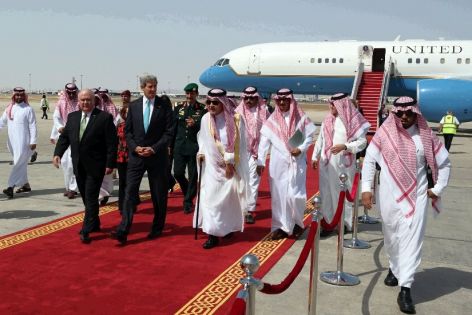Power Shifts in Yemen and Saudi Arabia
In the same week Yemen’s president resigned and the king of Saudi Arabia died. How will this alter U.S. influence in the Middle East and impact the region?
U.S. Secretary of State John Kerry walks with Saudi Foreign Minister Prince Saud al-Faisal and U.S. Ambassador Joseph Westphal on June 27, 2014 (U.S. State Department photo).
Before these two events, both Yemen and Saudi Arabia were considered strong American allies. In the volatile and radical Middle East, they have been seen as examples of moderation and stability. But as new leadership emerges, will the U.S. lose either (or both) of these allies and influence in the Middle East?
A power shift in Yemen?
As of this writing, there is still a power vacuum in Yemen, with no official political leadership over the country of 26 million. Despite the political instability Yemen has faced, former President Hadi was a stalwart U.S. ally. Mr. Hadi allowed the U.S. to launch drone strikes against terrorist cells operating in Yemen. U.S. efforts against terrorist groups in the Middle East will be impacted if an anti-American regime takes full control of Yemen.
This is important because Yemen is home to the dangerous terrorist group al-Qaeda in the Arabian Peninsula (AQAP). This group claimed responsibility for the Charlie Hebdo attack in Paris on Jan. 7.
AQAP has been linked to failed attacks against the United States, including the 2009 “underwear bomber” (who tried to down a U.S.–bound jetliner with explosives in his underwear) and a 2010 plot to ship bombs in printer cartridges on U.S. cargo planes. U.S. intelligence on AQAP is already being hampered by this power shift in Yemen.
In the past few years, Yemeni authorities have seized Iranian weapons headed to the Houthis. Now with Mr. Hadi no longer in control, it will be much easier for Iran to get weapons into Yemen.
Clearly, American interests and ability to combat terrorism in Yemen are at risk.
The future of Saudi-American relations
Saudi Arabia has a long history as a strong U.S. ally. King Abdullah was considered a friend of the United States, especially in the fight against al-Qaeda. Yet this friendship has been tested in recent years because of disagreements between U.S. President Obama and King Abdullah:
- King Abdullah was frustrated because President Obama refused to take a tougher stand against Iran’s nuclear program.
- Tension grew as the Obama administration wasn’t able to broker a peace agreement in the Israeli-Palestinian conflict.
- The relationship was tried when the United States supported the pro-democracy protests in Egypt and neglected to provide assistance to keep then President Hosni Mubarak in power.
- President Obama’s hesitance to support the Sunni opposition against Syrian President Bashar Assad has also distanced the two allies.
The new leader of Saudi Arabia, King Salman (King Abdullah’s half-brother), says that he will continue the policies of Abdullah. But at age 79, how long will this king—and the friendship with America—last?
What lies ahead for America’s influence in the Middle East?
Bible prophecy shows that because of increasing national sin, the U.S. will continue to decline as a dominant power, both in the Middle East and in the world (Deuteronomy 28:43-44). The recent coup in Yemen and the rise of a new king in Saudi Arabia could contribute to the demise of American influence in the Middle East.
Terrorist groups continue to attack those who support America. Will supporters of America, including those in the Middle East, finally decide that it is not worth the risk to be associated with America for their own personal safety and interests?
The Middle East continues to be a powder keg. The violence will continue to increase until Jesus Christ intervenes to bring peace by establishing the Kingdom of God on earth.
To learn more about the Middle East’s role in Bible prophecy, read:
Date Posted: January 30, 2015

 by Tim Groves
by Tim Groves

